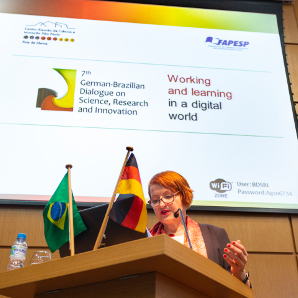Digital world: new scenarios for the job market
 © iStockphoto
© iStockphoto
The digital era influences the job market and the professional habits of many areas, therefore it is necessary to prepare people for living and working in this digital universe.
Transformation and evolution of professions
At the speed in which the job market is changing, primarily due to the digital era, we can say that the professions we know and work with today will soon be a reality of the past. That is, in the near future, all indications are that dozens of activities will be extinct, while others will be created to meet new market demands. And all of these changes have one thing in common: the 4th Industrial Revolution. This concept, which came up in Germany, during the Hannover Fair in 2011, is related to the so-called intelligent factories, known for digital technologies, such as Internet of Things, Big Data, and Artificial Intelligence. While, on the one hand, many believe that machines will substitute a human labor force, others state that well outros state that we will only experience a transformation and evolution of professions.
7th Brazil-Germany Dialogue - “Working and learning in a digital world”

To play the video, click the thumbnail. Once activated data will be transmitted to the respective provider. Watch on YouTube
This swelling digital wave across a broad range of sectors, along with its challenges, makes the debate on the trends and the various forms of research in this area an essential exercise. To contribute to this new reality, the 7th Brazil-Germany Dialogue on Science, Research, and Innovation – “Working and learning in a digital world” was held, in October 2018. The event, which pointed out the main scenarios for adapting the labor force in the digital era, attended by 15 experts in a broad range of areas from Brazil and Germany, was organized by the German Center for Research and Innovation São Paulo (DWIH São Paulo), in conjunction with the Research Foundation for the State of São Paulo (Fapesp).
Among the many projections and questions regarding what will be the areas most affected by the loss of job positions, or what types of occupations will “survive” in a digital world, one point was made very clear in the discussions by the experts who took part in the event: it is necessary to prepare our citizens for living and working in a digital world, and a large part of this responsibility is up to the State, through public policies.
The crucial role of public policies
In line with this trend, the keynote speaker of the event, Professor Hartmut Hirsch-Kreinsen, from TU Dortmund, twice stressed the crucial role of public policies in addressing the economic and social challenges brought on by the digital environment. “They must give incentive to cross-disciplinary cooperation among companies, universities, scientific and political institutions, associations, labor unions, and civil society, in order to promote Industry 4.0. They also play a supporting role in transferring the vision of Industry 4.0 to the companies, which are sometimes resistant to changes in their way of operating. And they should also stimulate the transfer of knowledge from high-tech companies to low-tech ones – especially to small and medium-sized companies.”
Besides these responsibilities, the Professor argues that governments must begin a debate with society regarding the challenges of Industry 4.0, and be careful to open the way for technological potential in such a way as to benefit society as a whole.
Germany X Industry 4.0 Platform
“In my country (Germany), the State has historically played a fundamental role in establishing an agenda of priorities and politics for research and development. It even launched the Industry 4.0 Platform, which seeks to identify the relevant trends and developments in the manufacturing sector and to combine them, in order to produce a common understanding of Industry 4.0,” said Hirsch-Kreinsen about what sector leads the transition to digital in his country. He is a member of the scientific counsel of the Industry 4.0 Platform. “It is my understanding that the establishment of an agenda should also involve the companies and labor unions, because they are partners and influential forces.”
Opinions on how to face and deal with the digital era in the work environment:

“According to experts who took part in the 7th Brazil-Germany Dialogue, machines could take over tasks in different types of work, but not all tasks. Digitization is changing jobs and not replacing them. Furthermore, we have heard of brand-new professions, such as Sustainable Manager, Data Miner, and Online Reputation Manager, just to mention a few. The main thing about this new reality is to ensure economic growth, social well-being, and new business opportunities.”Martina Schulze, Director of DWIH São Paulo

“There are two big challenges for job transformation: first, a numerical divergence between short-term job losses and the long-term creation of new jobs. Second, a difference between the profiles of the skills required by the substituted tasks and the profiles of the skills required by the newly created tasks. This gap is a strong justification for intensive measures for training and developing competences at all skill levels.”Hartmut Hirsch-Kreinsen, Professor at TU Dortmund

“The fact that these technologies at their very beginning, that is, they have not yet completed their maturation cycle, means that it is very difficult to measure their true impact. There are discrepancies in the available data, there are studies that predict the extinction of millions and millions of job positions; others indicate that job generation will be sufficient to compensate those job positions that were closed.”Glauco Arbix, researcher of the Innovation Observatory of the University of São Paulo (USP)
More about Working and Learning in a digital world
Magazine “Brazil-Germany Dialogue on Science, Research, and Innovation” (2019) – No. 07 is available here!
